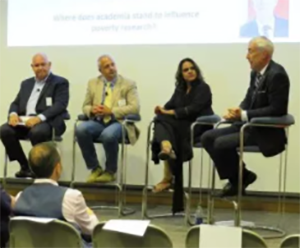Community leaders Dr. David Agnew, Mayor Frank Scarpitti, Vibhuti Mehra, and Jeremy Laurin discussed innovative solutions to fighting poverty in York Region at the GenNext speaks hosted by United Way on July 18, 2017
Community leaders Dr. David Agnew, Mayor Frank Scarpitti, Vibhuti Mehra, and Jeremy Laurin discussed innovative solutions to fighting poverty in York Region at the GenNext speaks hosted by United Way on July 18, 2017.
United Way Toronto & York Region (UWTYR) hosted the GenNext Speaks: Innovative Solutions to Fighting Poverty July 18 at the IBM Innovation Space-Markham Convergence Centre. Moderated by Julia Salzmann, the panelists included Dr. David Agnew, President of Seneca College, Jeremy Lauring, President and CEO of ventureLAB, Vibhuti Mehra, Executive Director of the AIDS Committee of York Region, and Mayor Frank Scarpitti of the City of Markham.
Recent research shows that York Region faces rising poverty levels and growing economic disparity. However, the region maintains an affluent appearance, and many people fail to recognize the number of struggling residents.
“Part of our challenge was convincing people that there’s a problem in York Region,” said David Agnew, mentioning research from the Living in York Region Vital Signs report which found that the rate of poverty among seniors in York Region is nearly double the provincial and national average.
Agnew also referenced the partnership between Seneca College and 360°kids, an organization that supports homeless and at-risk youth in York Region. Research from the partnership, he noted, helped bring to light the complexities of youth homelessness in the region.
“The project was successful in identifying a need,” Agnew explained, “And to me, that’s what [academia] can bring to the table: action-based research, outcomes-based activities that help not just our faculty, not just our students, but of course engage the community and provide solutions.”
As York Region continues to grow beyond its small town and rural roots, an increasing number of residents are struggling to keep pace. Affordable housing has become a forefront issue in many communities with average home prices in the region having risen 30 percent since last year alone.
During the panel, Mayor Frank Scarpitti addressed the role the City of Markham has played in addressing housing affordability, citing flexible zoning, diverse housing, and deferred development charges as steps the city has undertaken.
“We’ve done, I think, the practical things of what we can do. But obviously, those practical things in terms of regulations, in terms of what we permit [aren’t] solving the problem.” Scarpitti admitted.
On par for the theme of the panel, Scarpitti emphasized the need for creativity and innovation when tackling issues as broad as poverty and affordable housing.
“We have to get creative in terms of some other things that we’re going to have to do that allows people to get into the marketplace, but more importantly, we’re going to have to make sure that people have a place to live,” Scarpitti said.
Jeremy Laurin expressed a similar sentiment on the power of innovation to solve social problems. As the president and CEO of ventureLAB Innovation Centre, a non-profit tech accelerator, Laurin believes collaboration between innovators is key to overcoming social challenges.
“When you put innovative, entrepreneurial thinking people together in communities, and you give them opportunity to participate and contribute towards a persistent social challenge, the ideas that come out of [it] are transformational,” he said.
Laurin discussed ventureLAB’s Blueprint: Affordable Housing, an initiative from their communityBUILD program, to exemplify the impact of collaboration and innovation. Comprised of a two day design-lab and a three month incubator, Blueprint invited participants of all skill levels and backgrounds “to develop innovative, sustainable solutions to affordable housing challenges facing York Region.”
More than 115 residents came to Blueprint to generate ideas to address affordable housing issues in the region. Four teams were chosen to continue developing their ideas which included a starter kit to create a studio apartment in someone’s garage and an app that helped connect tenants and landlords.
Both Laurin and Scarpitti mentioned the importance of sustainability when generating solutions to poverty and affordable housing. “It’s not just about solving emergency issues,” Scarpitti said, “It’s about long term, sustainable, affordable housing for people.”
Scarpitti’s comment alludes to the ongoing discussion challenging the Charity Model. Many have become critical of the approach as it’s believed to “[reinforce] the underlying issues of poverty – hopelessness, powerlessness, and helplessness.”
Vibhuti Mehra addressed this issue as well. Speaking from her experience as the Executive Director of the AIDS Committee of York Region, Mehra discussed the impact on the Committee when they switched from the Charity Model to an asset-based model inspired by the sustainable livelihoods framework.
Originally developed to help eliminate poverty, the framework is more often used to address challenges in developing countries. Although, Mehra notes, its basic principles are easily applied in other situations.
Through use of an asset-based approach, the Committee changed to view clients not as people with deficits but as people with assets, and they worked to help clients utilize these assets to rebuild themselves and achieve goals.
Mehra also explained how the asset-based approach helped the organization reframe their view of themselves within the community, and emphasized the value of community collaboration.
“It also changed how we do our work internally,” Mehra said, “and our approach was to not look at ourselves as an under resourced tiny, little non-profit that doesn’t have enough funding to seeing our assets–our assets were our many, many partnerships in York region.”
Innovation, collaboration, and community: these are the integral tools to fighting poverty, as expressed by the day’s panelists and UWTYR president and CEO, Daniele Zanotti.
During his closing address, Zanotti drove home the importance of community and collaboration when tackling social challenges. “Community is at the centre… Canadians identify the best to solve issues, and to lead with people, not for. So we’re not going to fundraise or social service or agency our way out of this,” he stressed, “We’re going to have to ecosystem and collaborate our way out.”
Through collaboration and community development, UWTYR believes we can achieve tangible solutions to poverty in York Region. Zanotti spoke directly to the next generation (or “GenNext”) in his speech, saying, “it’s going to be with you, so the challenge is you have to disrupt us. The next generation of community builders has got to roll up their sleeves and do good old community development.”
Source: https://civicyork.ca/gennext-solutions-poverty-community-centre/






